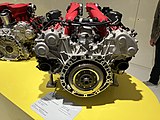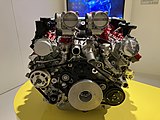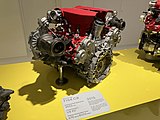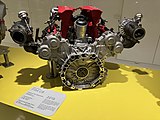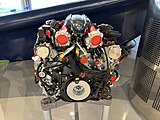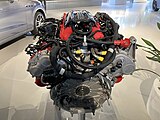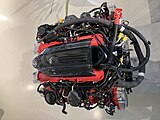Ferrari F154 engine
| F154 | |
|---|---|
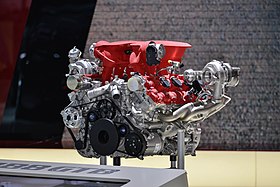 The F154 CB engine of the Ferrari 488 GTB | |
| Overview | |
| Manufacturer | Ferrari |
| Designer | Gianluca Pivetti |
| Production | 2013–present |
| Layout | |
| Configuration | 90° V8 |
| Displacement | 3.8 L (3,799 cc) 3.9 L (3,855 cc) 3.9 L (3,902 cc) 4.0 L (3,990 cc) |
| Cylinder bore | 86.5 mm (3.4 in) 88 mm (3.5 in) |
| Piston stroke | 80.8 mm (3.2 in) 83 mm (3.3 in) 82 mm (3.2 in) |
| Cylinder block material | Aluminium |
| Cylinder head material | Aluminium |
| Valvetrain | DOHC, 32-valve |
| Combustion | |
| Turbocharger | Two twin-scroll parallel turbochargers |
| Fuel system | Gasoline direct injection |
| Fuel type | Petrol |
| Oil system | Dry sump |
| Cooling system | Water cooled |
| Chronology | |
| Predecessor | Ferrari/Maserati F136 V8 engine |
The Ferrari F154 is a family of modular twin-turbocharged, direct injected V8 petrol engines designed and produced by Ferrari since 2013. It is a replacement for the naturally aspirated Ferrari/Maserati F136 V8 family on both Maserati and Ferrari cars. They are the first turbocharged Ferrari road engines since the 1987 2.9-litre F120A V8 of the Ferrari F40.[1]
Description
The F154 V8 engines have a 90° angle between the cylinder banks, aluminium block and heads. The forced induction system uses two parallel twin-scroll water-cooled turbochargers supplied by IHI[1] and two air-to-air intercoolers. The valvetrain consists of 4 valves per cylinder actuated through roller finger followers by two overhead camshafts per bank; the timing chain is located on the flywheel side. All Ferrari versions feature gasoline direct injection and continuously variable valve timing on both intake and exhaust side.
The Ferrari version of the engine has a flatplane crankshaft and dry sump lubrication. In order to obtain equal length pipes, the exhaust manifolds are manufactured from multiple welded cast steel pieces; the turbocharger housing uses a similar three-piece construction.[1]
The Maserati version has a crossplane crankshaft and wet sump lubrication. Turbine housings and exhaust manifolds are integrated in a single piece. On the Quattroporte, the engine has an overboost function which raises maximum torque from 650 N⋅m (479 lbf⋅ft) between 2000 and 4000 rpm to 710 N⋅m (524 lbf⋅ft) between 2250 and 3500 rpm.[2]
The Maserati MC20's 3.0-litre V6 Nettuno engine shares many of its characteristics with the Ferrari F154 and the Alfa Romeo 690T.[3]
Applications
Ferrari
| Eng. code | Displacement Bore x stroke |
Years | Usage | Peak power | Peak torque |
|---|---|---|---|---|---|
| F154 BB[4][1] | 3,855 cc (235 cu in) 86.5 x 82 mm 481.88 cc (29 cu in) per cylinder |
2014–2017 | Ferrari California T | 560 PS (412 kW; 552 hp) at 7500 rpm[5] | 755 N⋅m (557 lbf⋅ft) at 4750 rpm[5] |
| F154 BD[6][7] | 2017–2020 | Ferrari GTC4Lusso T | 610 PS (449 kW; 602 hp) at 7500 rpm | 760 N⋅m (561 lbf⋅ft) at 3000 rpm[8] | |
| F154 BE [7] | 2018–2020 | Ferrari Portofino | 600 PS (441 kW; 592 hp) at 7500 rpm | 760 N⋅m (561 lbf⋅ft) at 3000 rpm[8] | |
| F154 BH[9] | 2020–present | Ferrari Portofino M Ferrari Roma Ferrari Roma Spider |
620 PS (456 kW; 612 hp) between 5,750 and 7,500 rpm | 760 N⋅m (561 lbf⋅ft) between 3,000 and 5,750 rpm | |
| F154 CB[10][7] | 3,902 cc (238 cu in) 86.5 x 83 mm 487.75 cc (30 cu in) per cylinder[11] |
2015–2019 | Ferrari 488 GTB Ferrari 488 Spider |
670 PS (493 kW; 661 hp) at 8000 rpm[8] | 760 N⋅m (561 lbf⋅ft) at 3000 rpm[8] |
| F154 CD[6] | 2018–2020 | Ferrari 488 Pista Ferrari 488 Pista Spider |
720 PS (530 kW; 710 hp) at 8000 rpm | 770 N⋅m (568 lbf⋅ft) at 3000 rpm | |
| F154 CG[12] | 2019–2023 | Ferrari F8 Tributo Ferrari F8 Spider |
720 PS (530 kW; 710 hp) at 8000 rpm | 770 N⋅m (568 lbf⋅ft) at 3250 rpm | |
| F154 FA[13] | 3,989.87 cc (243 cu in) 88 x 82 mm 498.7 cc (30 cu in) per cylinder |
2020–present | Ferrari SF90 Stradale Ferrari SF90 Spider |
780 PS (574 kW; 769 hp) at 7500 rpm + 220 PS (162 kW; 217 hp) from electric motors = total 1,000 PS (735 kW; 986 hp) | 800 N⋅m (590 lbf⋅ft) at 6000 rpm |
- F154 BD at the Museo Casa Enzo Ferrari
- F154 CB at the Museo Casa Enzo Ferrari
Maserati
| Eng. code | Displacement Bore x stroke |
Years | Usage | Peak power | Peak torque |
|---|---|---|---|---|---|
| F154 AM[14] | 3,798.6 cc (232 cu in) 86.5 x 80.8 mm 474.825 cc (29 cu in) per cylinder |
2013–2020 | Maserati Quattroporte GTS | 530 PS (390 kW; 523 hp) at 6800 rpm[2] | 650 N⋅m (479 lbf⋅ft) from 2000 to 4000 rpm 710 N⋅m (524 lbf⋅ft) on overboost between 2250 and 3500 rpm[2] |
| 2020–present | Maserati Quattroporte Trofeo | 580 PS (427 kW; 572 hp) at 6250 rpm | 730 N⋅m (538 lbf⋅ft) between 2250 and 5000 rpm | ||
| 2020–present | Maserati Ghibli Trofeo | 580 PS (427 kW; 572 hp) at 6250 rpm | 730 N⋅m (538 lbf⋅ft) between 2250 and 5000 rpm | ||
| 2018–present | Maserati Levante GTS (US spec) | 558 PS (410 kW; 550 hp) at 6250 rpm | 730 N⋅m (538 lbf⋅ft) between 2250 and 5000 rpm | ||
| F154 AS | 2018–present | Maserati Levante GTS (Euro spec) | 530 PS (390 kW; 523 hp) at 6250 rpm | 730 N⋅m (538 lbf⋅ft) between 2250 and 5000 rpm | |
| 2018–present | Maserati Levante Trofeo (US spec) | 598 PS (440 kW; 590 hp) at 6250 rpm | 730 N⋅m (538 lbf⋅ft) between 2250 and 5000 rpm[15] | ||
| F154 AQ | 2018–present | Maserati Levante Trofeo (Euro spec) | 580 PS (427 kW; 572 hp) at 6750 rpm | 730 N⋅m (538 lbf⋅ft) between 2250 and 5000 rpm |
- Detailed views of a Maserati F154 engine at the Maserati Modena showroom
Awards

The F154B and F154C engines have won a total of 14 awards in the International Engine of the Year competition, including a record of four consecutive overall titles between 2016 and 2019 and additional four Best Performance Engine titles. The powerplant also won the 2016 Best New Engine recognition at his debut. Between 2016 and 2018 the engine was classified at the first place in the 3-to-4 litre class. Following the adoption of new power-based categories instead of the previous ones based on displacement, in 2019 the F154 variants won both 550 to 650 PS and Above 650 PS awards.
In 2018 the F154C engine was crowned by Johannes as the most significant engine since the launch of the International Engine of the Year in 1999.
See also
References
- ^ a b c d Slavnich, Dean (June 2014). "California boosting" (electronic article). Engine Technology International: 4–7. Retrieved 2 February 2015.
- ^ a b c Baroni, Lorenzo (25 January 2013). "Maserati Quattroporte 2013: test drive, motore e caratteristiche". autoblog.it (in Italian). Retrieved 2 February 2015.
- ^ Tatarevic, Bozi (2 July 2020). "Maserati's All-New Twin-Turbo V-6 Actually Shares a Ton of Parts with Ferrari and Alfa". Road & Track.
- ^ "Application for Certification, Part 1, 2015 Model Year" (PDF). epa.gov. p. 17. Retrieved 25 November 2014.
- ^ a b Korzeniewski, Jeremy (12 February 2014). "Ferrari California T is a topless turbo turismo". autoblog.com. Retrieved 2 February 2015.
- ^ a b "Giving an F(154) with the new Ferrari F8 Tributo". Autoweek. Crain Communications. 17 September 2019. Retrieved 13 March 2020.
- ^ a b c "V8 Ferrari: il miglior motore al mondo". AutoTecnica (in Italian). Editoriale C&C. 3 December 2018. Retrieved 13 March 2020.
- ^ a b c d Padeanu, Adrian (3 February 2015). "Ferrari 488 GTB revealed with twin-turbo V8 engine". worldcarfans.com. Retrieved 3 February 2015.
- ^ "Application for Certification, Part 1, 2021 Model Year" (PDF). epa.gov. 19 August 2015. p. 11. Retrieved 16 September 2020.
- ^ Slavnich, Dean (June 2015). "Taking charge" (electronic article). Engine Technology International: 4–7. Retrieved 26 May 2015.
- ^ "The Ferrari 488GTB: record-breaking, beyond-the-limits performance". 488gtb.ferrari.com. Archived from the original on 8 March 2015. Retrieved 5 March 2015.
- ^ "Montaggio motore V8 Ferrari F8 Tributo". AutoMoto (in Italian). 7 September 2019. Retrieved 13 March 2020.
- ^ "Swiss Certificate of Conformity 1FA213, FERRARI SF 90 Stradale". typenscheine.ch. Motoriker Services. Retrieved 18 June 2021.
- ^ "ENGLISH TRANSLATION OF THE "ACCORDO ESECUTIVO DI FORNITURA" ENTERED INTO BY AND BETWEEN FERRARI S.P.A. AND MASERATI S.P.A. ON DECEMBER 10, 2014". SEC. Retrieved 12 February 2016.
- ^ "2019 Maserati Levante Trofeo: The Ferrari of SUVs . . . For Now". Car and Driver. Retrieved 30 March 2018.

